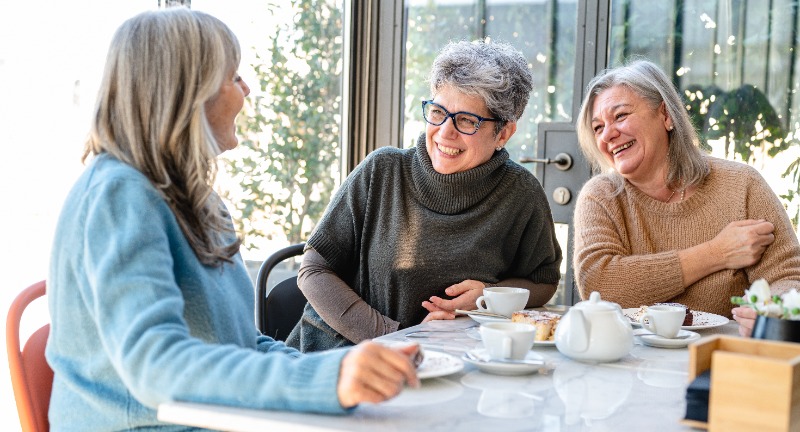
Shutterstock
Being likable isn’t about charm or charisma alone, it’s about making people feel valued, respected, and understood. Small social gestures like a genuine smile, thoughtful questions, or simply remembering someone’s name can leave a lasting impression. In a world where connections often feel surface-level, mastering a few key social skills can set you apart and create meaningful relationships.
Likability isn’t a talent, it’s more a skill anyone can develop with conscious effort and practice. Let’s explore 24 simple yet powerful social skills that will help you effortlessly win hearts and build stronger bonds.
Active Listening

Shutterstock
Active listening is more than hearing words—it’s about fully engaging with what someone is saying. By maintaining eye contact, nodding in agreement, or asking clarifying questions, you show genuine interest in their perspective. This skill makes others feel valued and respected, fostering stronger connections. When people sense they are truly heard, they are more likely to view you as approachable and likable.
Making Eye Contact

Shutterstock
Eye contact is a powerful nonverbal tool that conveys confidence and sincerity. It shows that you are fully present in the conversation, creating a sense of trust and intimacy. Avoid staring, but consistent, friendly eye contact can make others feel at ease. Mastering this skill helps people remember you as warm and genuine.
Genuine Smiling

Shutterstock
A smile is a universal sign of friendliness and positivity, making you instantly more approachable. When your smile is authentic, it radiates warmth and puts others at ease. People naturally gravitate toward those who exude positivity through their demeanor. Even in challenging situations, a well-timed smile can diffuse tension and foster goodwill.
Using People’s Names

Shutterstock
Using someone’s name in conversation is a simple yet effective way to create a sense of connection. It shows that you value their individuality and makes interactions more personal. People are more likely to engage with someone who acknowledges them by name. This small act can leave a lasting impression and make others feel important.
Showing Empathy

Shutterstock
Empathy allows you to connect with others on an emotional level by understanding their feelings and perspectives. Whether someone is sharing a joy or a struggle, responding with compassion builds trust and rapport. Saying, “I understand how you feel” or “That sounds challenging” can go a long way. Empathetic individuals are often seen as caring and likable.
Giving Compliments

Shutterstock
A well-placed compliment can brighten someone’s day and leave a positive impression. Focus on being specific and genuine, whether you’re praising their efforts, appearance, or achievements. Avoid overdoing it, as excessive flattery can come across as insincere. When done right, compliments show that you notice and appreciate the good in others.
Positive Body Language

Shutterstock
Your body language speaks volumes before you say a word. Open gestures, a relaxed posture, and nodding in agreement signal that you are approachable and engaged. Avoid crossing your arms or looking distracted, as these can create barriers. Positive body language fosters comfort and encourages others to open up to you.
Being Curious About Others

Shutterstock
Curiosity about others demonstrates that you value their thoughts and experiences. Asking open-ended questions like, “What’s your favorite part of this?” or “How did you get into that?” invites meaningful conversations. This skill helps build rapport and uncovers common interests. People appreciate feeling interesting and understood, which makes them more likely to enjoy your company.
Avoiding Gossip

Shutterstock
Steering clear of gossip shows integrity and respect for others, even in their absence. People are more likely to trust someone who doesn’t speak negatively behind others’ backs. It also creates an environment of positivity and mutual respect. Likable individuals build others up rather than tearing them down.
Practicing Gratitude

Shutterstock
Expressing gratitude not only makes others feel appreciated but also boosts your own positivity. A simple “Thank you for your help” or “I really value your advice” can leave a lasting impact. Gratitude strengthens relationships by showing you don’t take others’ efforts for granted. People naturally gravitate toward those who acknowledge and appreciate them.
Humor and Playfulness

Shutterstock
A good sense of humor can make interactions more enjoyable and memorable. Lighthearted jokes or playful banter help break the ice and create a relaxed atmosphere. However, ensure your humor is inclusive and sensitive to the situation. A likable person knows how to make people laugh without making anyone uncomfortable.
Being Punctual

Shutterstock
Arriving on time reflects respect for others’ schedules and reliability. It shows you value the time they’ve set aside for you, whether for a meeting, a social event, or even a casual chat. Punctuality also demonstrates self-discipline and responsibility. Consistently being on time builds trust and leaves a positive impression.
Respecting Personal Space

Shutterstock
Understanding and respecting personal space is key to making others feel comfortable. Pay attention to nonverbal cues, such as someone stepping back or leaning in, to gauge their boundaries. Invading someone’s space can make them feel uneasy, while maintaining the right distance fosters a sense of safety and respect. This sensitivity helps you build trust without saying a word.
Being Nonjudgmental

Shutterstock
A nonjudgmental attitude creates a safe space for open communication. People are more likely to share their thoughts and feelings when they know they won’t be criticized. This openness builds deeper, more authentic connections. By focusing on understanding rather than judging, you become someone people can trust and confide in.
Admitting Mistakes

Shutterstock
Admitting your mistakes shows humility and maturity, which people greatly admire. Rather than deflecting blame, taking responsibility demonstrates accountability and builds trust. It also sets an example of honesty and self-improvement. Likable individuals acknowledge their flaws and work to better themselves.
Remembering Details

Shutterstock
When you remember small details from past conversations, it shows that you were truly paying attention. Mentioning someone’s favorite hobby or asking about a project they discussed makes interactions more personal. This habit strengthens relationships by demonstrating genuine interest. People are flattered when their words are remembered and valued.
Using Positive Language

Shutterstock
Positive language helps create an uplifting atmosphere in any conversation. Instead of focusing on problems, try framing things in terms of solutions or opportunities. Words like “great,” “excited,” or “looking forward” convey enthusiasm and optimism. This upbeat communication style draws people to you and makes interactions more enjoyable.
Being Adaptable

Shutterstock
Social adaptability is the ability to adjust to different personalities, settings, and moods. By reading the room and tailoring your energy or approach, you show respect for the situation. Flexibility in your interactions allows you to connect with a wider range of people. Likable individuals make others feel comfortable, no matter the context.
Practicing Patience

Shutterstock
Patience is a sign of emotional intelligence and self-control. Waiting your turn to speak or giving others time to process their thoughts shows respect. It also helps you avoid coming across as pushy or impatient. People are drawn to those who create a calm, understanding presence.
Sharing Stories

Shutterstock
Telling relatable stories makes your conversations more engaging and memorable. A good story can entertain, inspire, or even comfort others by creating a sense of shared experience. Be sure to balance storytelling with listening to maintain a reciprocal dynamic. When done well, storytelling humanizes you and strengthens bonds.
Offering Help

Shutterstock
Proactively offering help, even in small ways, shows kindness and attentiveness. Whether it’s holding a door, sharing advice, or simply lending a listening ear, these gestures make a big impact. Helping others fosters goodwill and demonstrates your reliability. Likable people are those who consistently show up for others.
Staying Calm Under Pressure

Shutterstock
Remaining calm in stressful situations projects confidence and control. People look to calm individuals as a source of reassurance and stability. By managing your emotions, you inspire trust and comfort in those around you. A composed demeanor is a hallmark of likability in tough moments.
Being Reliable

Shutterstock
Reliability is one of the cornerstones of trustworthiness. When you follow through on promises, people know they can count on you. This dependability strengthens your relationships and enhances your reputation. Likable individuals consistently show that their word means something.
Celebrating Others’ Success

Shutterstock
Genuinely celebrating someone else’s achievements shows maturity and self-assurance. A simple “Congratulations!” or “You’ve worked so hard for this!” can mean a lot. Avoid jealousy or competition, and focus on uplifting others. Likable people make others feel valued and supported, especially in moments of triumph.
Conclusion

Shutterstock
Being likable isn’t about perfection; it’s about showing genuine care, kindness, and respect in your interactions. By incorporating these social skills into your daily life, you can foster deeper connections and create a positive, lasting impression on others. Remember, it’s the small, thoughtful gestures that often make the biggest difference. With practice and mindfulness, you can become someone people naturally gravitate toward and enjoy being around.


























































